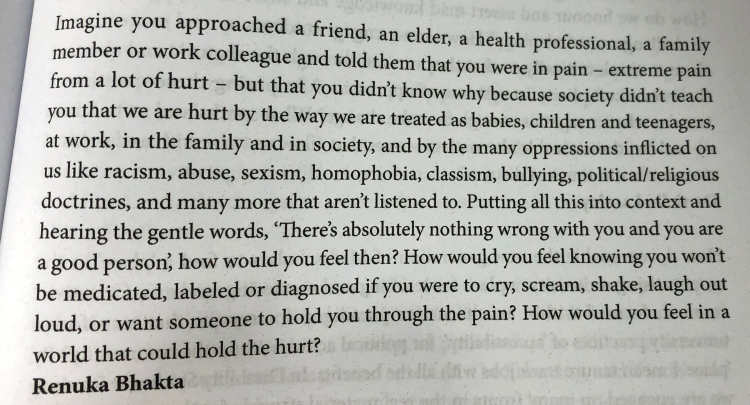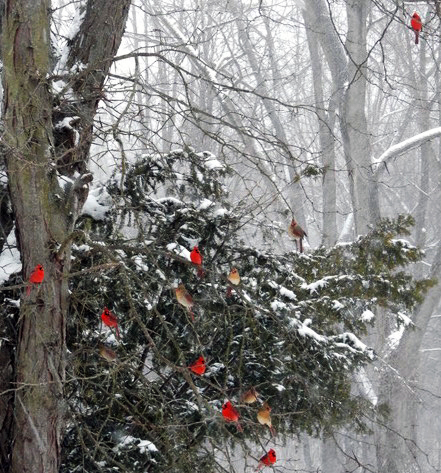Mad as Hell: The Violence of Education, and [t]werking 2wards uh Mad poetics
presented at SDS@OSU: Troubling Binaries of Academics and Activism
April 7, 2020
Phil Smith
philrobertovich@gmail.com
“…madness participates in the poesis,
the general sense of making, creating…” (Cooper, 1978, p. 84)
Madness
[and the knewly crafted/crapted
field and meadow and pasture of Mad Studies
and da work of deez/dem/doze who identify as Mad]
“is a way of knowing…” (Cooper, 1978, p. 155)
because
if for no other reason:
Mad gain.
aussi:
“…the method of studying the field of madness
must itself be involved in that madness.” (Cooper, 1978, p. 157)
sew:
i amma mad man
a madde elder.alder.older
altered and othered
a madden man
a man made/maid mad
a midden man
a mitten man
a ridden man
a hidden man hiding in closets
of saneist architookcher
i wander
wonder through lifetimes
lifelines
down the waze of a Mad poesis
a Mad Turn
that offers a way outta
the dead-end of academic and educational logical posi tivism
posi schism
posi chauvinism
posi racism
posi neoliberalism
posi homophobia
at the margins of disciplined
(whipping us all on the ass uv) neoliberal haberdashery.
some daze
i put on a jacket
(strait) (never tie) (tied up, tied down).
sum days
i walk barefoot
through the haul-ways and stare-weighs
of colonialist white privilege
privacy-phage.
always wearing, proudly, my handmaid(en) tinfoil hat
made mad by a world stranger
than even aye could possibly imagine
both befloor and aft of the COVID-19 27 32 hike!
a stranger
a strangled one
(voice tied up, tied down)
a bricoleur
searching for mad/ neuroqueer
travelers,
travailleurs
tall-king and thing-king and writhe-ing
about how to find and thread the capitalist needle
through a world that impoverishes
institutionalizes
torments
tortures
silences
us,
annihilates
sedates
truncates
medicates
negates
wastes
collates
stagnates
inmates
hates
US.
i wri{t}he
through per- formance and
trans- formance
and poesis and pieces and peaces and pisses
an explication of the meaning
of being a non-viole(n)t mad elder
(t)working and (t)witching and twirling and Turning
in the surface/service
uv an “in/discipline” (Ingram, 2008)
anti-founded
on/in/through/out/about
an academic and educational Turn towards the irrational
unreasonable
surreal
nonlinear
inappropriate
unmanageable
incredible
illegitimate.
an anti-methodology
opposite
2 increasingly commodified educational academe
it is a new kind of outsider onto-epistemology
that is, frank(bob)ly
crazy as a motherfucker.
it izza weigh to ex(im)plore the bawdy lustiness of untoward bodyminds
threw the outrageousness of impossible new educational imaginariums.
opposed to the typical neoliberal academified corporatizm
– be-cause/pause/caws/paws
all “forced learning is violence” (Coperthwaite, 2002, p. 54)
this Mad poetics
dis Mad tern
is out{in} de/re-signed
to raise Mad children and grand children
and nephews and nieces
to become and inhabit(ual) the next (re)generation
(and the next, and the next)(of kin)
of a new [neu]rodi(uni)versity.
hear, i twerk a madde turn
on da udder sighed uv
normative onto-epissedemoffemology
against the psy-complex
against the modernist psy-clops –
creating an anti-
oppositionally-defiant
disruptive non-viole[n]t
life/live/love.
saneism and adultism and ableism
force children
into the psychiatrized
segregated
carceral internment camps
that we caul schoolz. (Liegghio, 2016)
there, they are criminalized
and deprived of even the remotest semblance of
autonomy and self-determination. (Liegghio, 2016)
Instead, “Mad Studies offers
a metacurriculum
of unlearning” (Snyder, Pitt, Shanouda, Voronka, Reid, & Landry, 2019, p. 486)
through opportunities to create
“nonlinear course structure and arts-based assessment;
and the mobilization
of a mad positive pedagog” (Snyder, Pitt, Shanouda, Voronka, Reid, & Landry,2019, p. 486)
in solidarity with
deze|dem|doze Madzters
stoodents and teacher-creatures
knowledge-gatherers and manoor spreaders
i wander through the wilderness
uv diss-closure.cloture (un)closet.crochet.corset
too uh plaize where
we are all naturally free(dumb).
i describe and inscribe the meaning of this bodymind soulheart
in da saneist whirled/whorled
that the lying bureaucraps make uninhabitable for all.
wutzit look like?
if we knew/gnu/new/true/blew
and could do-re-me-fine it
it wouldn’t need tuh bee whuddevuh id iz that it wants to brie, wood it, brown cow?
referential art i fact [Hemmerh] oids
Cooper, D. (1978). The language of madness. NY: Penguin Books.
Coperthwaite, W. (2002). A handmade life: In search of simplicity. White River Junction, VT: Chelsea Green Publishing.
Ingram, R. (2008). Mapping “Mad studies”: The birth of an in/discipline. Disability Studies Student Conference, Syracuse University, Syracuse, NY.
Liegghio, M. (2016). Too young to be Mad: Disabling encounters with “Normal” from theperspectives of psychiatrized youth. Intersectionalities, 5,(3), 110-129.
Snyder, S., Pitt, K.-A., Shanouda, F., Voronka, J., Reid, J., & Landry, D. (2019). Unlearning through Mad Studies: Disruptive pedagogical praxis. Curriculum Inquiry, 49(4), 485-502. doi: 10.1080/03626784.2019.1664254

